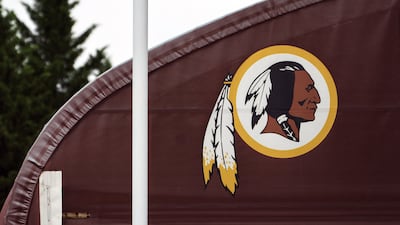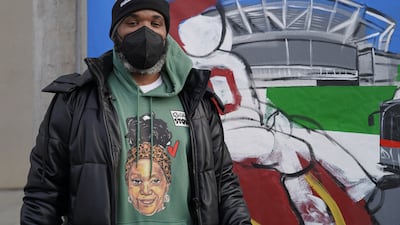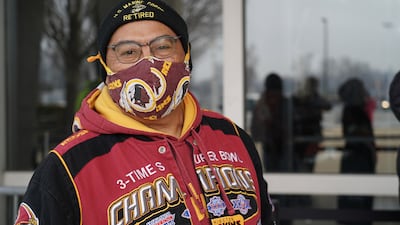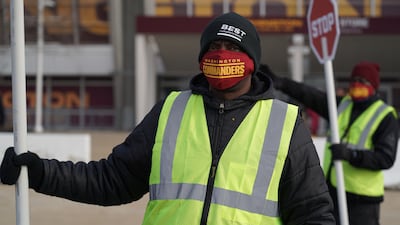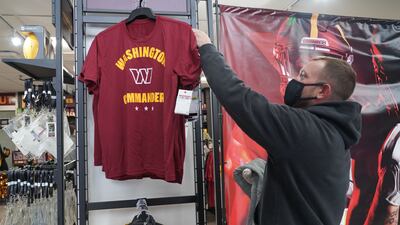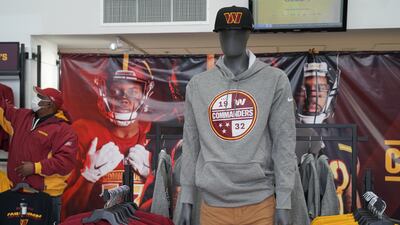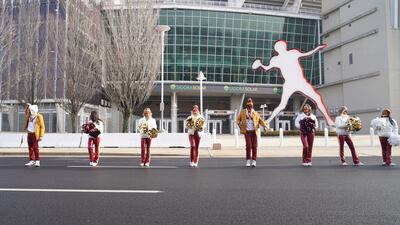The Washington Redskins are no more and have instead become the Commanders — a welcome change for Stan Walker, a lifelong fan.
Mr Walker, 70, gleefully dons the familiar burgundy and gold of his beloved American football team. His newly purchased T-shirt features a slanted W, which has replaced the famous profile portrait of a Native American warrior.
“I mean, the Pentagon's here, all the headquarters and of course the commander-in-chief is in the White House. I think it's great,” he said of the new name.
The name change better reflects the city that has hosted the franchise for nearly a century, said Mr Walker.
However it took years of protests, petitions and ultimately the threat of lost sponsorships from some of the world's biggest companies to convince team owner Dan Snyder to change the name.
Mr Snyder had vowed to never change it, but in July 2020, a few months after the police killing of George Floyd in Minneapolis and during a period of intense social and racial unrest, he accepted a name change was necessary.
Washington is not the first sports team to use racist words and imagery in its name and logo.
Indigenous imagery has long been misappropriated by mainstream culture. Data from Mascot DB show that about 2,000 high schools in the US use Native American names or imagery for their sports teams.
And even though the Redskins are no more, there are several other professional sports teams with Native American references in their names and logos: the National Football League's Kansas City Chiefs, Major League Baseball's Atlanta Braves and the National Hockey League's Chicago Blackhawks have all refused to change their names.
The use of Native American names for predominantly white institutions has had a deep and lasting impact on native communities.
“It causes immense psychological harm for native people,” said Arianne Eason, assistant professor at the University of California, Berkeley's department of psychology.
“In fact, what we know is that native-themed mascots and game-day rituals really undermine indigenous people's well-being.”
Many fans who support teams that use Native American imagery believe they are actually honouring indigenous peoples, which Ms Eason says is problematic.
“We really don't, as a society, have great awareness of contemporary native peoples and their experiences,” she told The National.
“This really drives some of the perpetuation of discrimination against the group, people holding on to the use of native mascots.”
This is not the first time fans have had to wrestle with the team's troubling legacy.
The man who moved the team from Boston to Washington and renamed them the Redskins in 1933, George Preston Marshall, was an avowed segregationist and the last NFL team owner to allow non-white players on his team.
The franchise has attempted to erase the stain by dropping Marshall's name from its Ring of Fame and renaming part of its stadium for the team’s first black player.
It has been a long road of self-reflection and understanding for many of the Washington team's diehard fans.
Tim Payne grew up in Virginia in the late 1980s at a time when the team was at the top of the league. From 1982 to 1991, they won three Super Bowl Championships and were a fixture in the playoffs.
“I think for a lot of people, those years as a kid kind of forms where your fandom lies,” said Mr Payne, who now lives in Texas but blogs frequently about the team.
“And so for me, a lifelong obsession was born and I haven't been able to shake it.”
It’s been a trying few years, with middling results in the league coupled with turmoil over the name change, and Mr Payne admits he was reluctant to accept the loss of such an important feature of his childhood.
“It was just the name of my favourite football team and I knew it was Redskins because it was an Indian logo but I didn't have in my lexicon the idea that it was a pejorative term or anything like that,” he said.
Eventually, he accepted that the name had to go after he understood the effect it has had on Native American communities.
“I still have fond memories of things connected to that name, but I totally understand why they had to make the shift,” he told The National.
He hopes the Commanders can find success so that the next generation of Washington football fans will associate the team only with winning.
